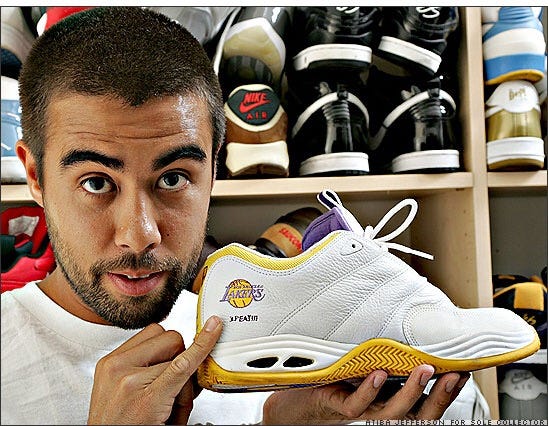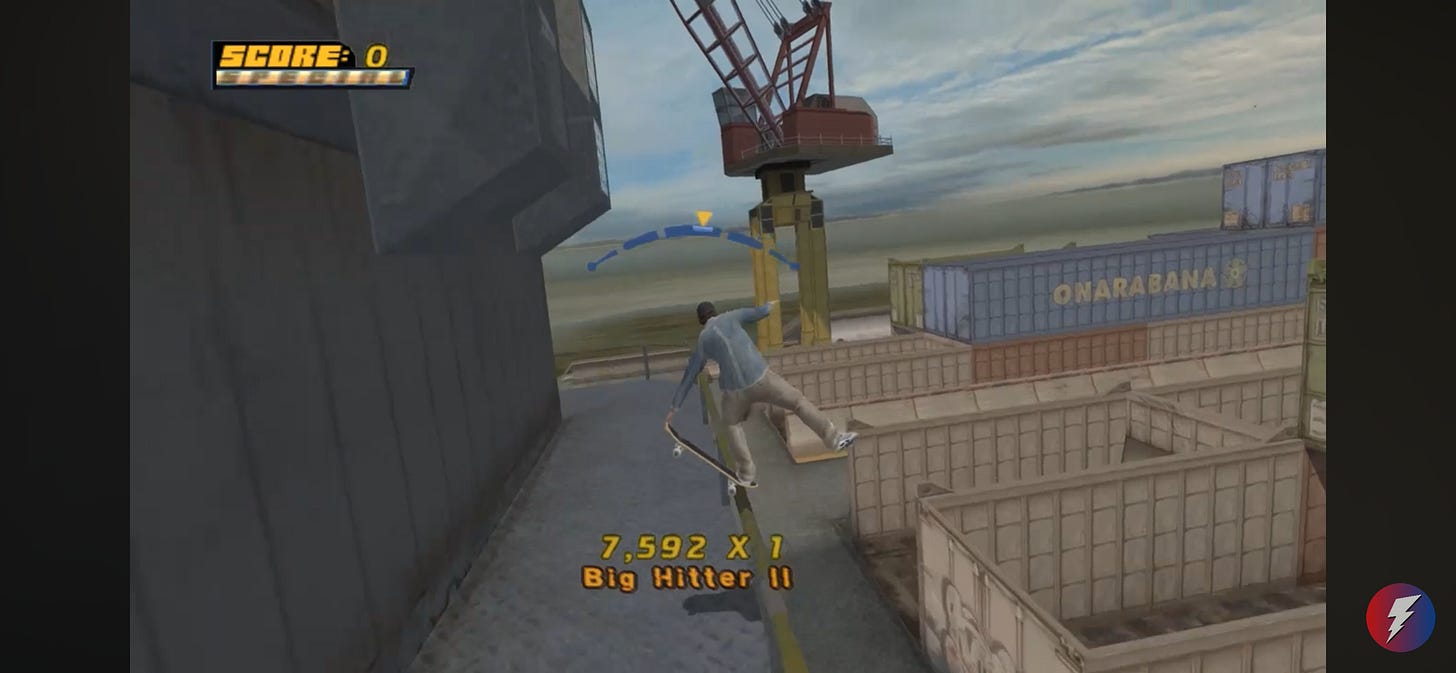The Special Meter 4: Last Shot at the Jocks
A look at how we define skateboarding/skateboarders’ most historic enemy
Welcome to the fourth edition of THE SPECIAL METER - a series on the Tony Hawk’s Pro Skater video game series, and how they existed alongside our culture at large. If you missed the first three, here they are:
The Special Meter 2: ‘Ollie the Magic Bum’ and Skateboarding’s Portrayal Problem
The Special Meter 3: Tony Hawk Made Skateboarding So Big that Even 9/11 Couldn’t Take It Away
Today’s essay is about Tony Hawk’s Pro Skater 4, which revolutionized the series by introducing the “open world” aspect, but anecdotally feels overshadowed by the rest of the catalog. More specifically, it is a look at how the game reflected a time where skateboarding was really losing its outsider status, as well as the age old rivalry of “jocks vs. skaters” by looking at how we define “jocks and skaters,” and their shared behavior we ignore because they wear different shoes (or do they?)
As I did before, here are some song choices for your skating/reading pleasure.
In September of 2023, comedian Bert Kreischer was the guest on Tony Hawk and Jason Ellis’ podcast, “Hawk vs. Wolf.” The show sort of has an open door policy when it comes to guests, reflective of Tony Hawk’s wide appeal across just about every conceivable subculture, and as a seemingly pretty normal and nice dude. Plus, Kreischer seems to do just about any podcast or show or commercial or appearance that asks him to, but he also seems like a genuine fan of skateboarding, or at least Hawk and the X-Games. His appearance probably also has to do with co-host and co-skateboarder Jason Ellis’s comedy ambitions, too, sometimes hitching his horse to somewhat irritating comedy wagons in the process of trying to boost his own status in the game it seems.
But Kreischer and Hawk have a bit of a shared history, or at least have touched on the same spaces throughout their careers.
Kreischer’s big break pretty much came when he appeared on Joe Rogan’s podcast, before COVID had completely melted Rogan’s already softening brain, to tell the story about how he accidentally got involved with the Russian mafia on a school trip during college - “The Machine” story.
“The Machine” story exists because Kreischer spent significantly more time at Florida State University than most of his classmates. Kreischer had built such a reputation as a partier in Tallahassee that Rolling Stone came down to do a profile on him.
That profile ended up as the basis of the movie “Van Wilder,” which hit theaters in 2002, the same year as Tony Hawk’s Pro Skater 4.
The first level in Tony Hawk’s Pro Skater 4 was a “College.”
With Tony Hawk 4, the franchise did away with the hectic time limits of each level, where you have to plan which goals you’re going to collect in each “run.” Now the game was more open-world, where you ride around the map and talk to other characters to begin challenges, the same way other action sports video game franchises such as Dave Mirra BMX or Aggressive Inline had already done.
It kept many of the tried-and-true goals of past games: high scores, trick-specific challenges, and collecting the S-K-A-T-E letters (in addition to introducing a C-O-M-B-O challenge that had to be done all in one trick sequence). But each level had setting-specific goals, too, and the college focused very heavily on the dynamic of skateboarders versus their archnemeses: the jocks.
Much like Scots and other Scots, skateboarders and the jocks were mortal enemies.
It was, and still sort of is, a common pop culture trope. But by 2002, skateboarding was a driving force in pop culture, calling into question whether skateboarders and skateboarding still had its outsider mystique and underdog bona fides. The line between skater and jock became increasingly blurry, and it gets even more blurry when you zoom in and question the definition of a “jock.”
How do you define the jock? In the THPS4 challenge, it’s someone on the football team. Easy enough. At this point, there was still clear distinction between traditional sport and skateboarding. That’s obviously changed now in the era of the Olympics, but back then the math checked out.
But by lumping in the frat boys, who also made appearances in the college level, and defining the “jock” instead by their attitude and behavior, you can see overlap, even back then.
The archetypical frat boy was someone who valued drinking, partying, debauchery, hijinx over the ostensible task at hand. For the frat boys, that’s school. But, that description also applies pretty well to the Baker team of the 2000s, many of them immortalized to this day as part of a subset called the PissDrunx. Skateboarding was almost incidental for guys like Ali Boulala, Dustin Dollin and even THPS character Andrew Reynolds.
And that’s to say nothing of the casual racism and sexism onlookers have seen from some skaters over time, not totally unlike what you’d hear about from fraternity events at schools across the country.
What about if you definie jockism as someone who doesn’t actually play a sport, but is interested enough in them to the point where they influence their lifestyle. Say, someone like Tony Hawk character Eric Koston modeling his éS pro model skate shoes after basketball sneakers that came in Lakers colors?
Could you define the jocks broadly as just the popular rich kids like the movies do? If you do, then by this point you’re including many of the skateboarders in the game, who were making a bit more thanks to more lucrative sponsorship deals, endorsements, and being part of a hit video game.
Here’s what Tony Hawk himself said on “The Nine Club:”
“When the fourth game was released, my main contact at Activision asked to have lunch with me in LA when I was there one day. […] He’s like, ‘Here’s what’s happening, we’re releasing the fourth game. The last three are still in the top 10 of sales, one is going into…’ I forgot what they call it, it’s like classics mode which means they sell it at a certain price but way more volume. […] He’s like, ‘So things are way bigger than you ever thought.”
And then they handed him a check for $4 million.
Let me be clear: I’m so happy that they secured that bag and that skateboarding got to that point. But it is still funny to play a game as a real life man who got a $4 million check during a lunch meeting knocking out frat guys in the name of subculture.
(Did your song end? Here are some more song choices to finish off the article)
That “skaters vs. jocks” theme carried over to the mini games within THPS4. At the college level alone, you could face off against a player named Bjorn in tennis. Of course, your character used his skateboard instead of a racket.
This sort of embodied the “lol what if we played real sports” attitude many skaters (or other non-jock subsets) held at the time – like that one kid in your gym class who never wore sport-appropriate sneakers and walked the mile out of protest. Now, not only do you have Nike and adidas absolutely dominating the skateboarding world in footwear, apparel and salary, and not only do you have guys taking advantage of actual sports science on a level even some traditional professional athletes might not get, but you now have the fitness influencer subset of skateboarders.
Guys like Neen Williams and Nick Dompierre, both formerly known for hard partying ways, are now certified fitness instructors with Instagram feeds full of kettlebells, chicken breast and Rogan-adjacency. These are guys who are, at their core, jocks, as long as that’s how you define it.
The point is, “jock” is a loose term.
There are also a lot of positive developments here.
At one point, it might’ve been considered ironic that the first level of a skateboarding game was a college. The only reason those rats are there is to destroy the steps and cause a ruckus, am I right? But now you have guys like Thrasher Skater of the Year Mark Suciu and more who are downright literate and intellectual in their skateboarding.
And you have meteorologists cruising at a skatepark delivering the news. You have Beto. Zac Efron. All of these types of people that wouldn’t have been seen as “core” skaters throughout history and by many within the game but who are, well, skateboarding.
One of the most popular Nike sneakers of all time, very much not just bought by skaters but by guys you’d call the jocks, was the Stefan Janoski model. Since it came out in 2009, the Janoski has sold enough shoes to realistically be up there with Jordan in terms of guys who have made influential Nike sneakers. Make the dramatization of that story, Affleck and Damon.
The bottom line here was that by the time Tony Hawk 4 came out, the sport was running out of its subculture credibility. It was a popular sport posing as the underdog. It was the last time it could realistically position itself as an opposing force against the mainstream. The skaters whose names you learned a few games ago were now driving nicer cars, and the idea of them taking down the jocks, many of whom were playing this game and becoming skaters in some way themselves (or even just tuning into it on ESPN - the worldwide leader in jocks), was harder to sell.
And with the greater console capabilities and need to go bigger than the previous three games, there was plenty of room for the franchise to forget about skateboarding altogether and become a caricature of itself. More wacky special moves, more zany mini games. More Muskabeatz.
The next move would be crucial for the series and the community. The next move would have to re-establish the franchise, and skateboarding as a whole, as an underground thing again.
See what I did there? Tune in next week.
Today’s Snakes and Sparklers musical guest is Muskabeatz.









